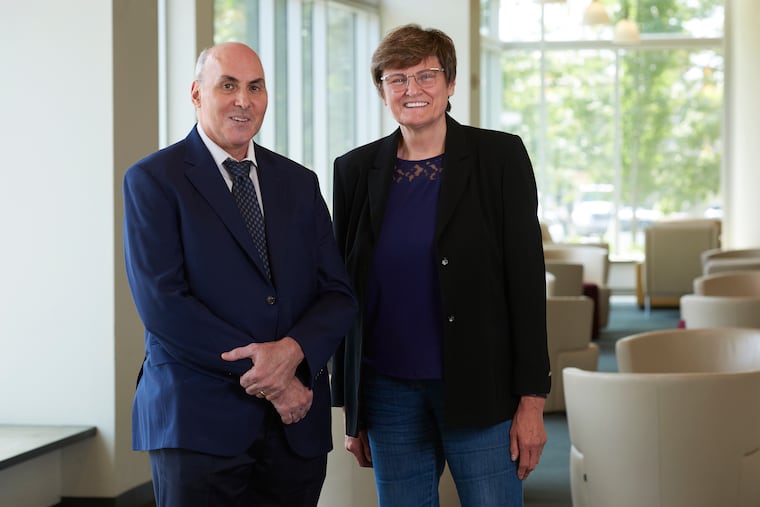Penn RNA pioneers snag another big prize for research that enabled COVID-19 vaccines
Katalin Karikó and Drew Weissman are sharing one of 2021's three Lasker Awards. The $250,000 honor comes two weeks after the pair shared a $3 million Breakthrough Prize.

Two University of Pennsylvania scientists have scored another big award for their research on messenger RNA (mRNA), the basis for two COVID-19 vaccines that are credited with saving many thousands of lives.
Katalin Karikó and Drew Weissman are sharing one of 2021′s three Lasker Awards, prize administrators announced Friday. The $250,000 honor comes two weeks after the pair shared a $3 million Breakthrough Prize, and 16 years after their first study that suggested mRNA could be a valuable tool in medicine.
Hundreds of scientists have helped to unlock the promise of this genetic molecule. But when Karikó took on the challenge in the 1990s, RNA research was widely seen as a dead end. The molecules degraded quickly, and, when administered to lab animals, could cause harmful inflammation.
In 2005, she and Weissman reported that by performing a slight chemical modification to the RNA, they made the inflammation all but disappear. That success, followed by others, set the stage for the first two COVID vaccines authorized in the U.S.: the one made by Moderna and the joint effort from Pfizer and BioNTech, where Karikó now works.
» READ MORE: RNA was never just about vaccines. It is being tested as a treatment for cancer and other diseases.
J. Larry Jameson, dean of Penn’s Perelman School of Medicine, said the award was an acknowledgment that the duo’s work applies to many diseases besides COVID, such as cancer and sickle-cell anemia.
“From the challenges and losses sown by the COVID-19 pandemic,” he said, “their breakthrough discoveries have emerged and allow us to see a brighter future for so many fields of medicine.”
Weissman, 62, and Karikó, 66, who still holds an adjunct position at Penn, have won more than a dozen awards between them since the dramatic early results were announced for the Pfizer-BioNTech vaccine, less than a year ago.
“I never sought any of this,” Karikó told The Inquirer earlier in September.
Some in academia predict the two are in line for the most prestigious prize of all, a Nobel. That honor typically is awarded years after the impact of research is realized, but the past year has been anything but typical.
This year’s Nobel winners are to be announced the first week of October. If Karikó and Weissman were to be considered for the honor in chemistry or medicine, other RNA researchers likely would be in the mix — though no more than three scientists may share a prize. Some key early advances came from other scientists in the 1980s, and many others came after Karikó and Weissman published two pivotal studies in 2005 and 2008.
“Everyone just incrementally added something — including me,” Karikó told Nature magazine recently.
The power of messenger RNA lies in its ability to deliver genetic instructions for making proteins: the building blocks of life.
In the vaccines, the mRNA prompts the recipient’s cells to make the “spike” protein of the coronavirus, enabling the immune system to safely make antibodies and other defenses in case it ever encounters the actual virus. For treatment of other diseases, mRNA would be used to spur the production of other proteins that patients were unable to make on their own.
After Karikó and Weissman made headway against the inflammation issue, additional research was needed to deliver the delicate genetic instructions inside a living cell. In the vaccines, the approach is to package the mRNA inside tiny, biocompatible droplets made from oily substances called lipids.
The new honor for the Penn duo is called the Lasker-DeBakey Clinical Medical Research Award.
Another Lasker award for basic medical research is going to three scientists who work with light-sensitive proteins: Dieter Oesterhelt of Max Planck Institute of Biochemistry, in Martinsried, Germany; Peter Hegemann of Humboldt University, in Berlin; and Karl Deisseroth of Stanford University.
A third honor, the Lasker-Koshland Special Achievement Award, is going to California Institute of Technology’s David Baltimore, a prominent researcher in immunology and cancer.
The awards are given by the nonprofit Lasker Foundation, established in 1942 by Mary Lasker, a longtime activist in spurring Congress to spend more on medical research, and her husband, advertising executive Albert Lasker.
Weissman and Karikó have said they plan to use some of their prize moneys to support their research. Karikó is among those studying the use of mRNA to treat other diseases. One of Weissman’s projects is improving vaccine equity. For months, he has been working with scientists in Thailand on another mRNA vaccine against COVID.
In August, when the pair got an award from Columbia University, Karikó recalled her reaction last November upon learning that the Pfizer-BioNTech vaccine seemed to prevent more than 90% of cases of disease.
“I celebrated by eating a whole box of Goobers chocolate, which was (first) made 100 years ago in Philadelphia,” she said. “Usually I don’t need the whole box! And of course, I’m not really celebrating until everybody is safe, and the pandemic will end.”
Though Karikó spends much of her time in Mainz, Germany, where BioNTech’s headquarters are located, the two remain in close contact. Soon after the mRNA vaccines were authorized, the pair got vaccinated together in Philadelphia.